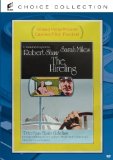| Reviews & Columns |
|
Reviews DVD TV on DVD Blu-ray 4K UHD International DVDs In Theaters Reviews by Studio Video Games Features Collector Series DVDs Easter Egg Database Interviews DVD Talk Radio Feature Articles Columns Anime Talk DVD Savant Horror DVDs The M.O.D. Squad Art House HD Talk Silent DVD
|
DVD Talk Forum |
|
|
| Resources |
|
DVD Price Search Customer Service #'s RCE Info Links |
|
Columns
|
|
|
Hireling (Sony Choice Collection), The
"I think we all have our place in life."
"We don't have our given place in life...we make our own."
Fascinating, particularly in the beginning...until a rather unfortunate (and obvious) third act. Sony's increasingly interesting, valuable Choice Collection vault of hard-to-find cult and library titles, has released The Hireling, the 1973 British period drama from Columbia Pictures, starring Robert Shaw, Sarah Miles, Peter Egan, and Elizabeth Sellars. Scripted by Wolf Mankowitz and directed by Alan Bridges, The Hireling managed to score a co-Grand Prix du Festival (along with Jerry Schatzberg's Scarecrow) at the Cannes Film Festival. Based on a novel by L.P. Hartley (whose novel, The Go-Between, had provided the basis for another Grand Prix du Festival winner in 1970), The Hireling's (familiar) exploration of isolation and inarticulateness within Britain's class system is intriguingly manifested here, until someone felt the need to ham-handedly spell out what the movie had already suggested to us so well. No extras for this good-looking (but muddy-sounding) anamorphic widescreen transfer.
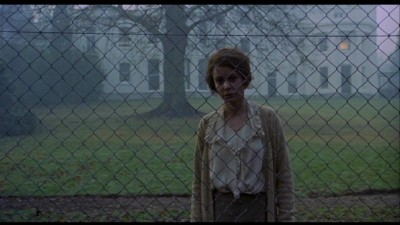
England, the 1920s. Lady Franklin (Sarah Miles, beautifully wan and frustratingly, just-out-of-reach erotic), institutionalized for a nervous breakdown (and possible suicide attempt) following the death of her husband, has been released from her posh asylum. Driven home by car-for-hire chauffeur Steven Ledbetter (Robert Shaw), a former Sergeant Major in the British Army, the fragile Lady Franklin tries to strike up awkward chitchat with the polite-but-correct (i.e.: knows his place) Ledbetter. Ledbetter, sympathetic to the obviously still-unstable Lady Franklin―while also acutely aware of the financial benefits to his tiny business should she become a regular client―eagerly accepts the job of ferrying Lady Franklin along on pointless drives through "her" county (where her husband stood in Parliament), even going so far as to agree to her sitting up front with him in his car, and accompanying her on picnics. Gradually convincing himself that some sort of deeper understanding, despite their class differences, has been forged between them, Ledbetter becomes jealous when Captain Hugh Cantrip (Peter Egan), a smooth, shallow aristocrat, cozies up to Lady Franklin, hoping her connections will aid his political ambitions.
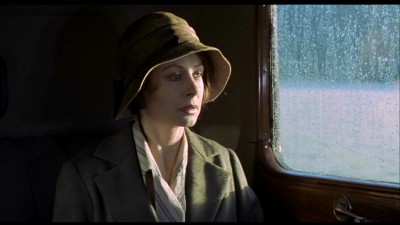
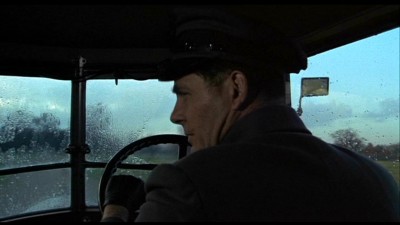
About half-way through The Hireling (which was completely new to me; I hadn't even heard of it before), so much of it was just so "right" that I thought it might join my list of favorite British class-conflict dramas, right alongside movies like The Servant, Room at the Top, The Go-Between, and The Loneliness of the Long-Distance Runner. Disappointingly, the movie winds down in a remarkably prosaic and clumsy fashion, pointing out for us the already readily apparent, until we have heretofore low-key (and quite excellent) Robert Shaw hamming it up something awful, shouting and crying and carrying on in a most unrealistic (for his character) and embarrassing (for Shaw himself) manner that seems to come from an entirely different movie. And as any moviemaker will tell you, no matter how brilliant the rest of the movie is, if you can't wrap up your story in a satisfactory manner and send the audience out suitably intrigued or thought-provoked or at the very least, reasonably satisfied with the story's resolution and thus, simply entertained...you've ultimately failed.
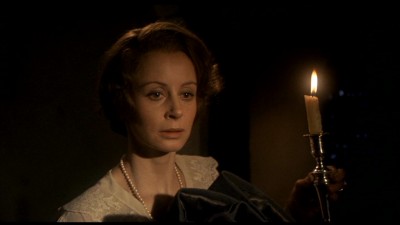
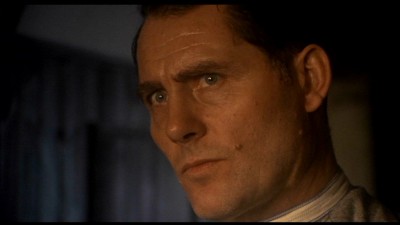
Directed by Alan Bridges (lots of TV, along with movies like Return of the Soldier and his masterpiece, The Shooting Party), The Hireling begins on a rainy, chilly, distanced note (that jump-cut to Miles looking out of the sanitarium is more horror than drama) and stays there, with Bridges resolutely refusing to give us what we expect in this kind of movie. There's no emphasis on highlighting the scenery, or the luxuriousness of the set designs, or producing a phony romantic patina to the attractive stars' interactions. It's a glum, dim, rather grungy-looking drama concerning the wealthy and the poor, and Bridges' visual schematic is completely in service to the detached, dysfunctional inhabitants of the storyline (for all of Shaw's and Miles' limo rides, Bridges never even gives us the brief respite of an outside shot of the car moving along; everything is interior, claustrophobic, with the principles―Shaw clipped and watchful and Miles vague and tremulous―usually separated in their own one-shots).
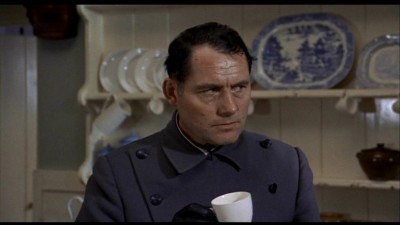
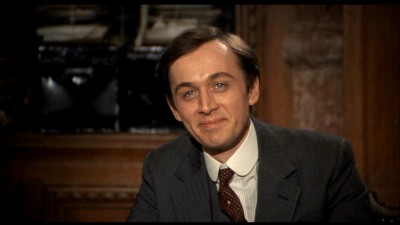
That dank, chilly visual aloofness (thanks to On Her Majesty's Secret Service cinematographer, Michael Reed) perfectly captures a world where no one is really listening to the other person, out of both rigid cultural habit and naked calculation/manipulation. The asylum's doctor (Lydon Brook), impatiently tapping his desk, isn't really listening to the warning signs from Miles that she's not ready to go home; he wants her out because form (and Miles' mother) dictate that enough is enough, and it's time for Miles to straighten up. Miles' mother (the incomparably imperious Elizabeth Sellars), isn't listening to her own daughter's torment, either; she's more concerned with "good form" being violated should a nearby window washer hear her daughter's loud, anguished sobs. When Shaw addresses his youth boxing club committee of businessmen and upper-class patrons, including incredibly snide, dismissive Egan, they barely even look at him, a "commoner," let alone acknowledge his efforts at organizing the charity exhibition. Amusingly, Egan gets the same treatment from Miles' luncheon attendees, when they try in vain to conceal their boredom at political hopeful Egan's badly-delivered, shallow pontificating. Shaw doesn't listen to or respect his car-hire partner and mechanic Davis' (Ian Hogg) thoughts, either, showing his aspirations to brutal, aristocratic behavior himself when Shaw humiliates Davis in the ring, slapping his face over and over again when put-upon Davis dares talk back to him. Miles, during their car rides, isn't really listening to Shaw's initial, tentative politeness for what it really is―careful hat-tipping to "Mi'lady" to keep her money sweet―nor does she detect the obvious lies Shaw starts spinning about having a wife and family. And when she does truly listen to Shaw for the very first time, when he's declaring his obsession with her, she recoils in fear and disgust at such naked emotion. Shaw's no better, ignoring Miles' mental instability and incorrectly taking her stabs at avoid/denial chattiness for real friendship, before he commits the cardinal sin of lying to an emotional devastated person to manipulate them―a deeply ironic act considering how he'll break down when all artifice is ripped away at the end of the movie.
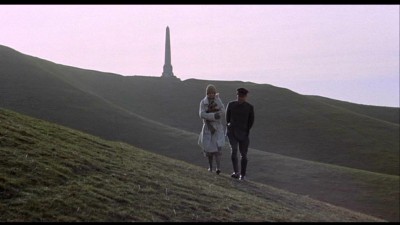
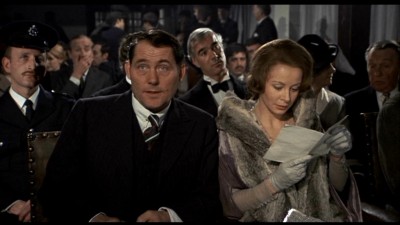
Of course, The Hireling's central irony is the movie's best in-joke: if we accept the subtly corrosive, restrictive, perverted English class system, then Miles comes off "best"--at her most human, her most sympathetic―when she's at her deepest mental and emotional imbalance. In other words, an aristocrat like her would have to be "sick" to make a friend of her chauffeur, and conversely, when she regains her "health," she comes to her "senses" and completely forgets him, going back to her ridiculous, ineffectual world of fund-raisers and parties and country weekends at the Grange with Egan, her twit lover. Screenwriter Wolf Mankowitz (The Day the Earth Caught Fire, Where the Spies Are, Casino Royale) pins that inevitable conversion back to hopeless, out-of-touch aristocrat on her useless philanthropy. Instead of actively helping all those dirty, hungry little kids she passed in Shaw's limo countless times, she makes her first tentative return to "normalcy" by becoming involved in her community: donating a trophy cup to Shaw's boxing club―a pointless gesture endorsed by the dazzled-yet-clueless Shaw, for the tough kids who need the least help (she's so ineffectual and sterile she doesn't even comprehend the notion of competition: she wants to give prizes to all the boys). That social-climbing effort by Shaw, the boxing exhibition, proves to be his undoing, as smooth, cheating, upper-class nob Egan aces him out with Miles in one night, treating her to a sumptuous dinner and laughing conversation (contrasted by Shaw's awkward "date" at the grungy fight club), while Shaw, put in his place as the chauffeur for his "betters," cools his heels outside, and seethes.
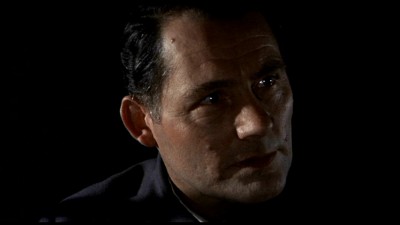
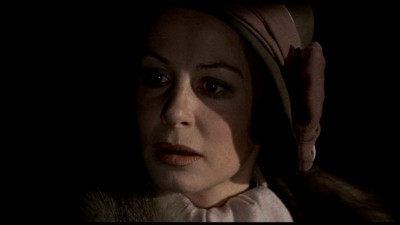
Had The Hireling ended there, we would have understood perfectly everything the story had to say. Unfortunately, the movie goes on for another 35 minutes or so, repeating the same scenes and spelling out in the most explicit, flat-footed terms what was so subtly and cleverly brought out before, culminating in two almost laughably bad scenes―Shaw's angry declaration of love for Miles, as a train rushed by (!), and his final anachronistic verbal assault on her and Egan―that greatly diminish the movie's overall impact. It's almost as if the moviemakers didn't trust the audience to "get it," a bizarre notion since they treated the set-up with such intelligence and subtlety. Shaw, quietly and powerfully alert and magnetic in the first two acts of the movie (think how commanding he was when he avoided histrionics and stayed low-key, such as The Taking of Pelham One Two Three), comes apart at the seams in this final act, hamming it up terribly in the confrontation (he even drools in a previous scene, for god's sake, and the director inexplicably left it in), screaming and yelling in that incongruous, weirdly high voice he pulled out from time to time. It's an embarrassing moment for the actor, in a completely unnecessary coda for what could have been a brilliant movie.
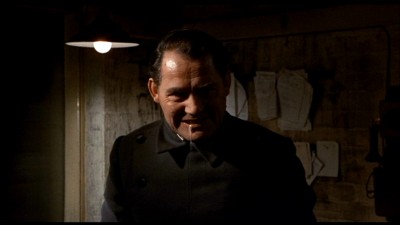
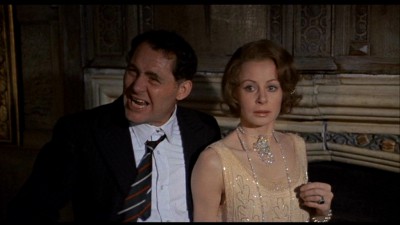
The DVD:
The Video:
The anamorphically-enhanced, 1.85:1 widescreen transfer for The Hireling looks quite good, with a relatively sharp, darkish, nicely valued print, with minimal grain.
The Audio:
The Dolby Digital English mono audio track, though, is muddy...and not from the transfer (I suspect bad recording in the original materials). Some of the dialogue is difficult to make out; subtitles would have helped, but none are available.
The Extras:
No extras.
Final Thoughts:
A fascinating first hour gives way to repetition and finally, ridiculousness. Still...that first hour is languid and strange, and worth a look. I'm recommending The Hireling only for those who love this kind of vintage British drama.
Paul Mavis is an internationally published movie and television historian, a member of the Online Film Critics Society, and the author of The Espionage Filmography.


|
| Popular Reviews |
| Sponsored Links |
|
|
| Sponsored Links |
|
|
| Release List | Reviews | Shop | Newsletter | Forum | DVD Giveaways | Blu-Ray | Advertise |
|
Copyright 2024 DVDTalk.com All Rights Reserved. Legal Info, Privacy Policy, Terms of Use,
Manage Preferences,
Your Privacy Choices | |||||||









